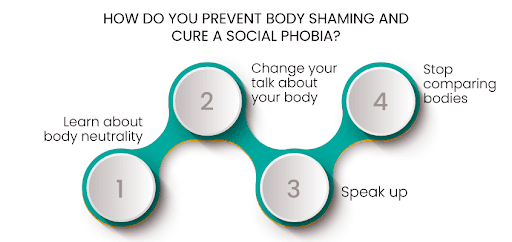Introduction
Negative comments about a person’s physical appearance entail body shaming. It can be about someone else or your body, and it can be about a person’s hair, clothing, food, perceived attractiveness, size, age or hair.
Body shaming can result in mental health problems, such as eating disorders, depression, anxiety, low self-esteem, body dysmorphia, and a generalised feeling of body hatred.
What is body shaming?
Body shaming is humiliating yourself or someone by criticising their physical appearance. You may hear negative comments if you’re underweight, overweight, or your physical appearance doesn’t align with the pseudo standards set by society.
You can sometimes unintentionally or unknowingly direct this criticism towards others or yourself, dislike your weight or body shape and size and judge yourself harshly, tell yourself, “I need to stop stuffing my face with food”, or “I feel so fat.”
It can happen in person or online on social media, and it can come from your siblings, friends, parents, or even people you don’t know well.
Joking about your weight or the amount of food you eat is a form of body shaming. Intentional or not, it is body shaming to give someone diet advice or encourage taking up weight-loss programs. Your family and friends don’t intend to harm your feelings, yet their comments might be harsh and hostile.
Everyone feels pressured to look confident, but body shaming is unnecessary and unacceptable. There are techniques to overcome body shaming, cultivate body positivity, and have a more compassionate and realistic view of yourself.
What are the early symptoms of body shaming?
Here are the symptoms of body shaming:
- Self-criticism in comparison to another person’s appearance.
- Commenting on someone else’s appearance in their presence
- Criticising someone’s appearance without their knowledge.
Whatever its form, this encourages comparison, shame and the belief that we should assess people based on their outward appearance.
Body shaming is unfortunately common among people of all sizes and shapes. Both “too fat” and “too skinny” have been targets of body shaming, with the focus often on completely irrelevant characteristics. Ads, magazines, and websites play a role in normalising harmful forms of body shaming. The “fat” character is frequently the target of criticism and comic relief in numerous T.V. shows and films. Understanding the possible consequences of the popular trend of celebrity fat shaming on social media is critical.
Read More About What You Need to Know About Teenage Depression
What are the causes of body shaming?
Some of the causes of body shaming are:
Age
Age-shaming is age-based discrimination or bullying, and it is about older people. Commenting that people of a particular age group are too old to wear makeup or try on the latest fashion trends is ageist body shaming. It includes criticising wrinkles or drooping skin as well.
Hair
Western culture has always praised sleek, straight hair. Curls and other hair textures are assumed to be less attractive, called texture-shaming.
“They’re brave to wear natural hair” is texture shaming, and it’s an insult and signifies that a person’s hair isn’t typical and that they’re wrong for wearing it naturally. All genders with receding hairlines or thinning/balding scalps experience bald-shaming.
Attractiveness
As “pretty-shaming,” bullying or discrimination against attractive people is expected. People face criticism for being ugly, which is lookism.” Lookism is prejudice or discrimination against persons who are physically unattractive or don’t meet social beauty standards.
Pretty-shaming is when gorgeous women are less likely to get authority jobs. Unattractive persons may have fewer opportunities because of lookism.
Body Hair
Except for specific health issues, hair grows on our private areas, underarms, arms, and legs. Many believe women must permanently remove all body hair.
Weight
One of the most prevalent reasons individuals get body-shamed is their weight. People can be too big or thin and criticised for the same. It is fat-shaming, and it can contribute to weight gain and unhealthy eating habits.
Food
Food shaming is about body size, including comments about what someone is or isn’t eating and someone saying they look like they don’t need to be eating is food shaming.
Clothing
Spandex is a privilege, not a right, was a famous saying in the 1980s. It meant only “correct” body shapes should wear spandex, and it is clothing shaming.
How do you prevent body shaming?
Some ways to facilitate the prevention of body shaming include:
Learn about body neutrality
However, mental wellness requires body neutrality. It’s accepting bodies without judgment, including your own body and others, and promoting positive body functioning. Understanding it can improve your relationship with food and boost your self-esteem.
Change your talk about your body
It can be challenging to speak positively about our bodies in a society that emphasises what is wrong with us and what needs improvement. Acknowledging our bodies is one of the best ways to protect ourselves from unwarranted judgement or criticism.
By speaking positively about ourselves and our bodies and noticing qualities we like and appreciate, we can deepen our care, compassion, and connection with ourselves and others.
Speak up
If you see someone commenting on another person’s body, whether it’s about their clothing, age, or body shape and size, tell them it’s unkind. If it often happens with friends or loved ones, you can say to them that their ways of communicating about bodies are not always appropriate.
You should speak up if you see someone’s body shame another person at work.
Read this for more tips on dealing with body shaming at work.
Stop comparing bodies
People may mock and body-shame others, but you don’t have to accept, participate, or tolerate it. You know it can lead to significant issues, and you wouldn’t want it done to you. Stop pointing out a person’s body hair, hair type, or size. Instead, say something nice.
Explore Our Self-paced Courses
Conclusion
Body shaming involves being excessively focused on physical appearance. Being thin or athletic might lead to eating disorders, poor self-esteem, and self-loathing.
You can heal your body image so you can walk in peace. Set a good example by not commenting on other people’s bodies. Instead, talk about their inner qualities. Please encourage others to think before posting on social media; remind them that there’s a person on the other side of the screen. You can help end this with some open and healthy conversations. If you seek professional help, come to our online mental health portal United We Care.
Talk To Our Experts
References
[1] Walden, “Body shaming: What is it & why do we do it?” Walden Eating Disorders, 04-Dec-2013. [Online]. Available: https://www.waldeneatingdisorders.com/blog/body-shaming-what-is-it-why-do-we-do-it/. [Accessed: 24-Jan-2023].
[2] L. Robinson, “Test,” 2022.
[3] L. Slawsky, “Body shaming,” National Association of Anorexia Nervosa and Associated Disorders, 05-Apr-2019. [Online]. Available: https://anad.org/get-informed/body-image/body-image-articles/body-shaming/. [Accessed: 24-Jan-2023].
[4] C. N. C. Ariane Resnick, “What is body shaming?” Verywell Mind, 28-Jan-2022. [Online]. Available: https://www.verywellmind.com/what-is-body-shaming-5202216. [Accessed: 24-Jan-2023].











